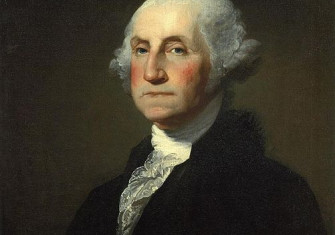‘A Revolutionary Friendship’ by Francis D. Cogliano review
A Revolutionary Friendship: Washington, Jefferson, and the American Republic by Francis D. Cogliano explores a relationship more complex than that of comrades turned rivals.

One cannot imagine the founding of the United States without George Washington and Thomas Jefferson. The first was a leader who commanded the Continental Army through hardship and a series of defeats to ultimate triumph in the American War of Independence. The other was a purveyor of ideas whose words in the Declaration of Independence sum up the American creed. But despite their crucial service to the new nation, the two men fell out after Washington became president. Jefferson had begun sniping at the administration while serving as secretary of state during Washington’s first term. He graduated to full-blown opposition leader during the second. Opposition paid off when Jefferson was elected to the presidency in 1800, a year after Washington’s death. In January 1801 the president elect went to Mount Vernon to visit Washington’s grave and pay his respects to his widow. Martha Washington did not appreciate the tombstone tourist: she recalled that, ‘next to the loss of her husband’, Jefferson’s social call ‘was the most painful occurrence of her life’. No doubt she echoed George’s feelings when she called Jefferson ‘the greatest misfortune our country had ever experienced’.
At the time of Washington’s death, there was clearly no love lost between the two men. Francis Cogliano’s decision to describe their relationship as ‘a revolutionary friendship’ may therefore seem a bold move. If Washington’s friendships resembled his relationship with Jefferson, his enemies must have been something else. Admittedly, Cogliano uses the term ‘friendship’ in a specific way: to describe a partnership in a political cause. Yet even in this sense, their ‘friendship’ did not touch or transform either man. There is nothing in the Jefferson-Washington relationship that resembles the bond between, say, Jefferson and James Madison, or Washington and Alexander Hamilton. The occasions when the two men worked intimately together on political projects were few and far between. Revolutionary Friendship is, therefore, less a story of intertwined than of parallel political lives. But Cogliano provides an important reminder that for most of their careers, Jefferson and Washington were not enemies but comrades. His lively book offers a brilliant introduction to two superstars of the founding of America, to the dramatic events they lived through and to the conflicts that shaped their interactions.
For more than two decades, before their relationship soured, Jefferson and Washington worked in tandem to promote revolution. Both condemned Parliament’s power grab in the 1760s, both defended armed struggle against Britain and both supported a declaration of independence. When Jefferson was governor of Virginia, Washington thanked him for his support of the war effort. When Washington became president, Jefferson was his first choice as secretary of state. It helped that they not only shared ideological convictions, but that their backgrounds made them one of a kind. They were both Virginians, planters and slave owners.
The revolutionary friendship came to an end with the post-revolutionary settlement. In 1789 Washington became president and set out to build a central state apparatus strong enough to defend independence and promote the interests of the US. This involved putting public finances in order and creating a small professional army. These measures seemed necessary to secure the safety of the new nation. Gradually, Jefferson came to disagree. The institutions and policies launched under the direction of Washington’s energetic secretary of the treasury, Alexander Hamilton – a productive revenue system, a perpetual public debt and a powerful national bank – resembled too closely the government machinery found in what Jefferson called ‘the harlot England’, and other European monarchies. These institutions propped up aristocracy and kept the people in a state of everlasting exploitation. By the time he resigned from Washington’s cabinet on 31 December 1793, Jefferson was convinced that the president was in thrall to a Hamiltonian party striving to turn the American republic into a monarchy.
In the minds of most Americans, Washington epitomised the young US and opposing him was problematic. Jefferson and his allies therefore cast their resistance to the administration as opposition to Hamilton, claiming that the president had been duped by his devious treasury secretary. It is largely thanks to Jefferson’s manoeuvrings that Washington has long been cast as a president aloof from party, too busy chomping down on his false teeth to contribute an opinion on politics. But Cogliano shows that Washington was an adept politician. Although he lacked formal education, he was an avid reader of political literature. Before the War of Independence he was a member of the militant Virginia colonial assembly, an active supporter of the boycott of British imports and the co-author of the Fairfax Resolves, a principled statement against Parliament’s right to tax America. As president, Washington took full responsibility for the actions of his administration. He told Jefferson as much: ‘in condemning the administration of the government’, his critics ‘condemned him, for if they thought there were measures pursued contrary to his sentiments, they must conceive him too careless to attend to them or too stupid to understand them.’
Cogliano makes a convincing case that even the bitter enmity of the 1790s did not eradicate the two men’s agreement on the basics of the American political project. President Jefferson never tore down President Washington’s government. Over time Jefferson came to appreciate some of the measures he had previously criticised, including Hamilton’s fiscal innovations. But more importantly, they agreed on the central features of the state-building project: the uneasy compromise over the continuation of slavery, the promotion of westward expansion and the dispossession of the indigenous population, and the imperative of preserving the federal union as the only guarantee of self-determination.
-
A Revolutionary Friendship: Washington, Jefferson, and the American Republic
Francis D. Cogliano
Harvard University Press, 368pp, £31.95
Buy from bookshop.org (affiliate link)
Max Edling is Professor of Early American History at King’s College London.






